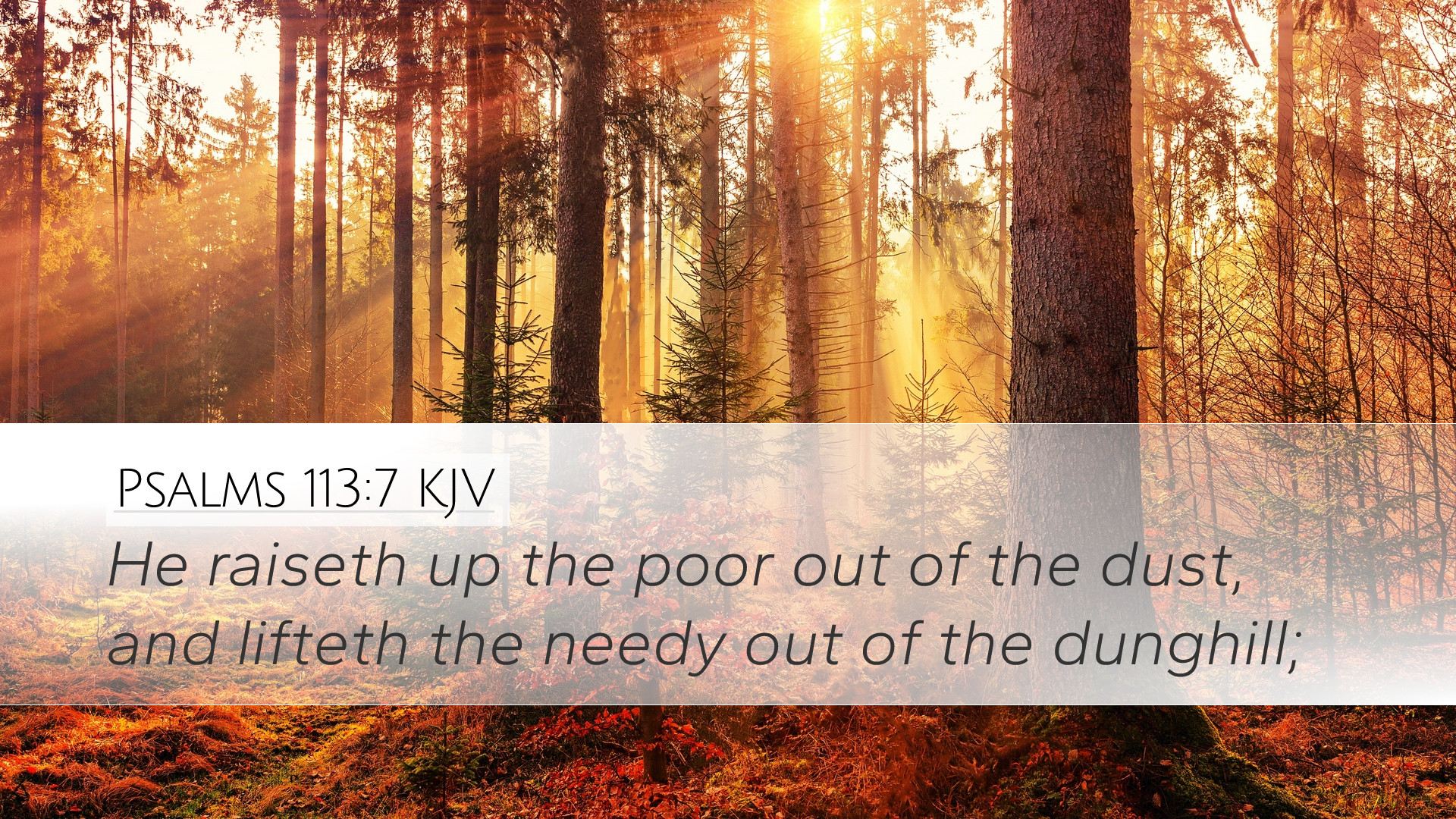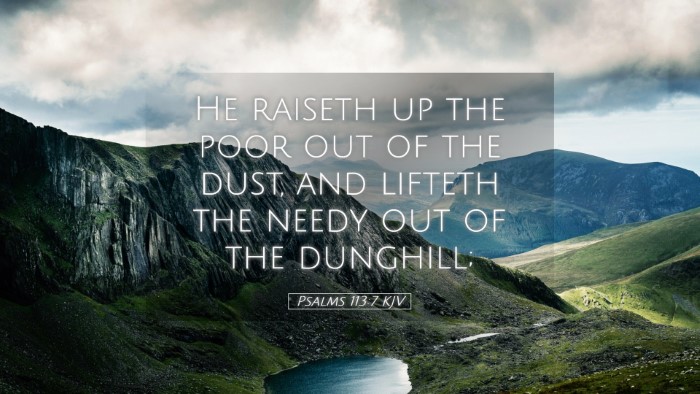Psalms 113:7 - Commentary and Insights
Bible Verse: "He raises the poor out of the dust, and lifts the needy out of the dunghill." (Psalms 113:7)
Introduction
This verse from the book of Psalms, attributed to the psalmist, serves as a profound declaration of God's sovereign grace and mercy toward those who are marginalized and downtrodden. In this commentary, we will explore insights from several public domain sources, including Matthew Henry, Albert Barnes, and Adam Clarke, focusing on the themes of divine assistance, social justice, and the transformational work of God in the lives of individuals.
Contextual Background
Historical Context: Psalms 113 is part of a group of psalms known as the "Hallel," traditionally recited during Jewish festivals. The psalms celebrate God's supremacy and His favorable disposition toward the needy.
Theological Themes
- Divine Elevation: The imagery of raising the poor "out of the dust" signifies God's power to elevate those in humble and destitute conditions. Matthew Henry notes that God not only sees their plight but actively intervenes to change their circumstances.
- God's Compassion: God’s action of lifting "the needy out of the dunghill" signifies His deep compassion for those in the lowest societal ranks. Albert Barnes emphasizes that God's attention to the poor is a testament to His love and mercy.
- The Nature of God's Kingdom: Adam Clarke points out that the establishment of God's kingdom is marked by the upliftment of the marginalized. This reflects the counter-cultural nature of God's reign, where the last shall be first.
Detailed Commentary
Matthew Henry's Perspective
Matthew Henry remarks that the act of raising the poor signifies not merely a physical elevation but also a spiritual one. He argues that those whom God lifts are transformed from a state of humiliation into honor. Notably, the dust represents human frailty and mortality, while being lifted symbolizes the grace that brings dignity and worth. The "dunghill," a metaphor for the most degraded position in society, highlights God’s capacity to rescue and renew the most despised of humanity, suggesting there are no limits to God’s redemptive power.
Albert Barnes's Analysis
Albert Barnes elaborates on the neediness referenced in the psalm as indicative of spiritual and material poverty. He emphasizes that God's intervention is both immediate and profound. Barnes states that lifting the needy from their squalor not only provides relief but also imparts hope. The act affirms God's active role in the world, as He aligns Himself with the oppressed, challenging societal norms that neglect the poor.
Adam Clarke's Insights
Adam Clarke asserts that this verse speaks emphatically to God’s nature as an advocate for the marginalized. He interprets the "dust" as a symbol of humility and the "dunghill" as representative of disgrace. Clarke emphasizes that this rescue is not merely a physical act but also a spiritual transformation, suggesting that God lifts individuals to a new status within His family, where worth is not determined by social class but by divine grace.
Practical Applications
- Social Justice: The themes in Psalms 113:7 call for a Christian response to poverty and social injustice, encouraging the church to engage actively in uplifting the marginalized.
- Hope for the Downtrodden: This verse serves as a reminder for those in despair that God cares intimately for them and is capable of transformation. Pastors can offer encouragement from this text to those experiencing hardship.
- Emulation of Divine Action: Believers are called to reflect God’s uplifting nature in their interactions, demonstrating compassion and giving aid to those who are suffering.
Conclusion
Psalms 113:7 encapsulates a powerful and transformative truth about God’s character—that He is a God who elevates the humble and rescues the needy. The insights from Matthew Henry, Albert Barnes, and Adam Clarke converge to paint a vivid picture of divine grace at work in the lives of those who are often overlooked by society. For pastors, students, and theologians, this verse not only offers theological richness but also inspiration for active faith that seeks justice and mercy in a broken world.


